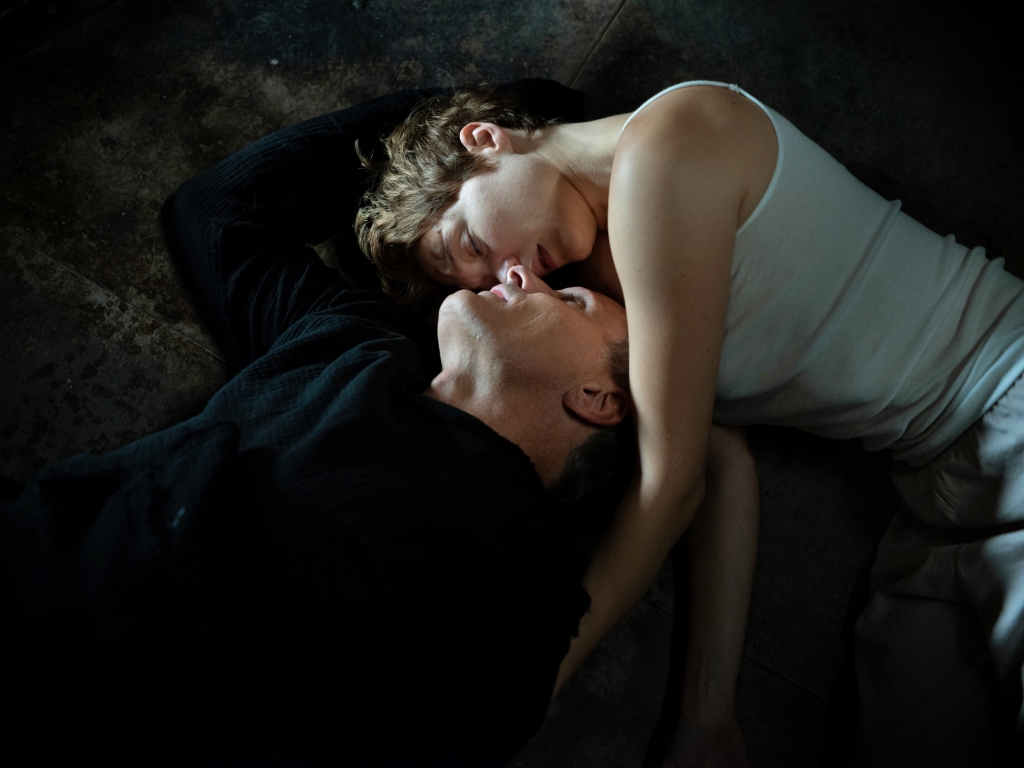Reviews include Deadpool & Wolverine, Doubles, and Mountain Queen: The Summits of Lhakpa Sherpa.
TFCA Friday: Week of June 3
June 3, 2022

Welcome to TFCA Friday, a weekly round-up of film reviews and articles by TFCA members.
Let’s start by wishing Film Freak Central a happy 25th! Here’s Bill Chamber’s on the site’s silver anniversary: “I suppose I should speculate on the key to FFC’s longevity, because 25 years is an eternity in cyberspace. Other than reducing my presence as avatar of the site (my face on Moses’s body used to greet readers on the main page, and I virtually awarded year-end ‘Billys’ in a variety of spurious categories like Worst Movie Critic (‘Me’–I won that one twice) and Best Sex Scene (‘Charlize Theron/Connie Nielsen w/Keanu Reeves in Devil’s Advocate’–good choice), FFC remains fundamentally unchanged from the same mix of reviews, interviews, and the occasional think-piece it always was. The only pivoting we’ve done is to grow more mature…We are teachable, though we’ve avoided the most cynical forms of progress, i.e., the kind where we’re chasing trends. ”
In Release this Week
A Chiara (dir. Jonas Carpignano)
“Jonas Carpignano’s A Chiara is a stunner,” raves Anne Brodie at What She Said. “[Chiara’s] life is turned upside down so completely, that it shifts between trauma and joy in inventive, risky ways thanks to Carpignano’s unique perspective on the emotional thriller. A gut-punch of an ending that intriguingly posits different outcomes. A Chiara will wake you up and take you places you’ve never been.”
“Remember the college episode of The Sopranos, when Tony’s daughter Meadow confronts dad about his mob antics?” asks Radheyan Simonpillai at NOW Toronto. “Imagine that story as a low-key, tender coming-of-age story. Fifteen-year-old Chiara (played by captivating non-actor Swamy Rotolo) finds out from news headlines that her doting dad is a suspected mafioso, which sends her spiralling out on a rebellious streak while trying to find the truth.”
“Director Carpignano’s fable of Chiara is not a coming-of-age story but one that seems to provide more confusion than closure to her somewhat secluded life of school, home and vaping,” admits Gilbert Seah at Afro Toronto.
“Writer/director Jonas Carpignano spends a good long while showing us that Chiara is a comfortable young woman, well off to the point of being spoiled,” observes Chris Knight at the National Post. “But her cozy life comes crashing down when her father is revealed to be a suspect in a major criminal investigation. Soon, family members are going into hiding, and she’s hustled into a foster care program for the children of Mafia families. Which she didn’t even know she was.”
“The film’s tone and the story structure are both naturalistic, and realistic,” notes Karen Gordon at Original Cin. “Carpignano doesn’t force huge moments of upheaval in the film, or story points where characters have sudden shifts of personality to heighten the drama or bring the story to a dramatic conclusion. We’re experiencing what Chiara experiences, and again that documentary feel works to keep the story intimate.”
Coda (dir. Claude Lalonde 🇨🇦)
“Narratively simple, Coda is nonetheless a treat for the senses,” admits Chris Knight at the National Post. “Helen convinces Henry to take a trip to Sils Maria, an idyllic, mountainous region of Switzerland that Quebec director Claude Lalonde frames beautifully. And Ukrainian-Canadian pianist Serhiy Salov doubles at the keys for Stewart, who may be many things but is not a trained pianist. His performances of works by Beethoven, Bach, Rachmaninoff, Chopin and more are flawless, except when the screenplay requires that Henry stumble.”
Crimes of the Future (dir. David Cronenberg 🇨🇦)
“Welcome to the nightmare ahead, where people grow new organs as art, modify body parts for fashion and consume plastic for food,” writes Peter Howell at the Toronto Star. “Crimes of the Future presents a world to come that’s made all the more terrifying by David Cronenberg, master filmmaker and seer of dark visions.”
At That Shelf, Jason Gorber chats with David Cronenberg, Viggo Mortensen, and Léa Seydoux about body horror and baring oneself for the audience to see. “For me, when I act, I act with my body, but I act also with my soul, and that’s exactly what the film’s about, where you give your body and soul,” says Seydoux. “It’s true that I think that as an artist, you have to put your flesh on the table. And David literally put flesh on the table! When I act it’s the same, otherwise it wouldn’t be interesting if I was trying to protect myself. I think it’s also what I’m looking for – I’m exposing myself, but with that state of vulnerability.”
“The film explores the ways in which we are both at home in our bodies and outside them, treating them as means to get what we need, but also as the very vessels that have those needs,” writes Chris Knight at the National Post. “Or in some way ARE those needs. But while this is all fantastic food for thought (though hopefully not plastic food) it does tend to overshadow the characters, who often seem pushed about by the film’s ethos, rather than having their own agency. It’s hard to empathize with a character whose main function is to embody an idea.”
“David Cronenberg’s Crimes of the Future is a magnificently dirty movie,” raves Barry Hertz at The Globe and Mail. “Partly because it is set in an undefined era where handwashing is no longer de rigueur – thanks to a quirk in human evolution, pain has become obsolete, infections have vanished and basic hygiene is unfashionable. But mostly, Crimes of the Future is a dirty little thing because it dives deep into the muck of humanity, where Cronenberg finds a perverted pleasure in the absence of pain. Every millimetre of this film is filthy, decayed, polluted. And thank God for that.”
Hertz also chats with David Cronenberg and Viggo Mortensen, and gets their thoughts on that “sicko, haha” meme that’s been percolating around the ’net as Kristen Stewart fans and company awaited the film’s squishy, squirmy premiere. “‘Well, I wouldn’t let this guy into my film. But yes, I have no idea what this is,’ Cronenberg says while studying the image on [Hertz’s] phone with a wry smile. ‘I do, though, consider Viggo totally deviant.’”
“[T]he bleakness Cronenberg piles onto the landscape, whether it’s a child playing by the seaside near the wreck of a fallen ship, or well-dressed socialites chatting over cocktails, weighs too heavy to be appreciated,” admits Thom Ernst at Original Cin. “Rumours of walkouts during the Cannes screening of Crimes are no doubt authentic—my Twitter feed would confirm as much. The assumption is that the walkouts are due to the graphic content, which I find harder to justify. Images of surgery and other (brief) elements of violence do not register as anything but synthetic. These scenes might be disturbing, perhaps, but far from real.”
“Cronenberg is one of Canada’s prized directors and his works are always worth seeing,” notes Gilbert Seah at Afro Toronto. “Crimes of the Future is a worthy wait of a Cronenberg film, his last one made after a while.”
“Cronenberg is back,” declares Eli Glasner at CBC. “Droll, disturbing and surprisingly sentimental Crimes of the Future marks director David Cronenberg’s return to what he’s best known for — a vivid and visceral obsession with the body and characters driven to alter themselves…But under the organs and the shocking sights which include the autopsy of a young nude boy, there’s a melancholic strain to Crimes of the Future that could surprise fans. Is it possible to call a movie about people who willingly mutilate themselves sweet?”
“It’s important to point out that Cronenberg has created his story out of a strange but fascinating phenomenon, performance art. In 1971, around the time that the original Crimes of the Future was released, American artist Chris Burden was deliberately shot in the shoulder in a performance called Shoot, which was impassively documented by a videographer and photographer. Notorious at the time, Burden’s performance inspired a song by Laurie Anderson, ‘It’s not the bullet that kills you, it’s the hole,’” notes Marc Glassman at Classical FM. “So, Crimes of the Future is speculative fiction arising out a reality that Cronenberg experienced many years ago. It’s a fascinating film and truly a work of art.”
“As a captivated fan, Kristen Stewart delivers the movie’s thesis: ‘Surgery is the new sex,’” says Radheyan Simonpillai at NOW Toronto. “The line is an updated take on Videodrome’s ‘long live the new flesh,’ which is fitting because at its best, Crimes of the Future is simply adapting Cronenberg’s old fixations, on the need to feel pain and its erotic potential, to a new era with an evolved society and a different body (politic).”
At the Toronto Star, Marriska Fernandes speaks with David Cronenberg and Viggo Mortensen about their ongoing collaboration, and how the dynamic works now that Mortensen’s had a chance to direct Cronenberg in his feature debut Falling: “We are professionals, unbelievable as it seems, so it means that we can say no to each other,” Cronenberg tells Fernandes. “If I offered Viggo a role, and he really feels he’s not right for or doesn’t connect with it, he has to be able to say no, and I am not going to be shattered and think he’s not my friend anymore. And the reverse is true. If Viggo had a project or a script that he wanted me to direct, I would have to say no if I really didn’t want to do it. So there’s that respect and that professionalism despite the tomfoolery that we enjoy.”
“If there’s one true surprise to Crimes of the Future, however, it’s not the dead kid nor the cringe-worthy autopsies. It’s the electric chemistry between McKellar and Stewart,” notes Pat Mullen at That Shelf. “They offer one of the truly great screen pairings of contemporary cinema. They are the Tracy and Hepburn of the Cronenbergundian. Crimes of the Future is an unexpectedly darkly funny for a Cronenberg film, and McKellar and Stewart arguably make it click. The film straddles a razor’s edge of black comedy with surgical precision.”
Fire Island (dir. Andrew Anh)
“Fire Island won’t replace Clueless as the sharpest romantic comedy inspired by a Jane Austen book,” admits Glenn Sumi at NOW Toronto. “But its novel setting, completely queer creative team and…refreshingly raunchy gay sex scenes make it terrific Pride Month viewing. Even if director Andrew Ahn is no Amy Heckerling.”
At Afro Toronto, Gilbert Seah calls it “an irrelevant film about irrelevant issues and about gays living in a fantasy world – pure escapism for the gay crowd.”
“Is there anything sexier than Mr. Darcy in the rain? A shirtless Mr. Darcy in the rain, perhaps, as Fire Island puts the pride in Pride & Prejudice,” writes Pat Mullen at That Shelf. “Forget Mr. Darcy in the rain—there’s no sight like two hot men reading.”
Foxhole (dir. Jack Fessenden)
“Multi-threat director Fessenden deserves credit for the film’s ambitious concept,” admits Liam Lacey at Original Cin. “But Foxhole often feels on-the-nose and without escalation of intensity of any effective story. Even if the theme is war’s futile repetition, there are more concise ways to make the point. The example that comes to mind is the 1970 Motown hit, ‘War’ by Edwin Starr and The Undisputed Truth: ‘War, huh,(good God, y’all) what is it good for? Absolutely nothing, just say it again.’”
Freakscene: The Story of Dinosaur, Jr. (dir. Philipp Reichenheim)
“Had the filmmakers added voices outside the super-rarified alt-rock arena, Freakscene might have felt much more rounded, with Dinosuar Jr’s place firmly established in the context of fleeting contemporaries like Better than Ezra, Blind Melon, and Collective Soul, to name three actual hitmakers of the times,” observes Kim Hughes at Original Cin. “But this is a valentine, not a discerning look at the band or the era that defined it.”
The Janes (dir. Tia Lessin, Emma Pildes; June 8)
“The talking heads format lets history be told by those who lived it,” remarks Pat Mullen at POV Magazine.“Lessin and Pildes also put the women on equal footing and respect the collective nature of the group. There are heartfelt and compelling testimonies here. Close calls, terrifying arrests, and tough, soul-searching conversations about how women won by working together make for worthy viewing.”
Jazz Fest: A New Orleans Story (dir. Frank Marshall and Ryan Suffern)
“Jazz Fest goes away from its main subject, the music, to show off the amazing food in the city: there are mouth-watering scenes of people cooking and eating jambalaya, gumbo, pork cracklin’, beignets, crawfish and even alligator,” munches Marc Glassman at POV Magazine. “Venturing into the streets, we see marching bands—it seems every high school has one–and hear about the funerals that celebrate the lives of the recently departed as they are accompanied to the cemetery for their last trip though the city.”
“The film features stellar editing, with performances and audiences from decades ago melding seamlessly into modern-day footage without missing a beat,” writes Chris Knight at the National Post. “We also learn the difference between Cajun and Zydeco, two close musical cousins, broadly Black and white in their racial histories, but living together harmoniously. That might sound sappy or overly idealistic, but you’ll come away from Jazz Fest: A New Orleans Story with a renewed belief in the power of music to bring humans together.”
“Sifted in between the performances are interviews and archival material, which take us back to the city’s history of joy and sorrow, from slaves on Sundays, playing music and dancing on Congo Square (now Louis Armstrong Park) to the jazz funerals in New Orleans,” writes Liam Lacey at Original Cin. “That history foreshadows a later segment on the devastation of New Orleans caused by Hurricane Katrina in 2005 which features Bruce Springsteen performing ‘My City of Ruins’ during an emotional moment in the 2006 festival. Says The Boss in retrospect, ‘There are certain moments when you meet your audience, and that’s when the healing begins.’”
“[S]tresses the power of music; also what makes the United States great,” says Gilbert Seah at Afro Toronto. “The scenes of different races of the spectators dancing hand in hand make the movie.”
“Ignore the accurate but uninspired title: Jazz Fest: A New Orleans Story is the kind of electric, spirit-lifting music documentary that will make you want to reinvent your life so that you can live your entire existence in the heart of Louisiana,” advises Barry Hertz at The Globe and Mail. “Perhaps the filmmakers could have eased up on the close-ups of triple-fried New Orleans cuisine – the point at which the doc truly dips into pedestrian CNN travelogue territory – but the entire affair is a love letter, so why not go for the heart and thus the inevitable heart attack? Let Jazz Fest save your soul and worry about your cholesterol levels later.”
The Righteous (dir. Mark O’Brien 🇨🇦)
At Original Cin, Jim Slotek calls the film “a claustrophobically intimate supernatural thriller” and speaks with Mark O’Brien about navigating both sides of the camera in his feature debut. “As I kept writing it, I realized, as an actor, there’s certain things you see you might be good for. You have an understanding of why you got one part and didn’t get another. I just thought, ‘What I have to offer would be good in this thing,’” O’Brien says. “By the time I was halfway through writing it, I knew I was going to do it.”
“O’Brien has had an unusual career trajectory. In addition to television work – most notably in The Republic of Doyle – he’s had small roles in big films (Arrival and Bad Times at the El Royale, to name but two) and won several directing prizes for his short films,” notes Chris Knight at the National Post. “With his writing/directing/acting credits in The Righteous he’s stepping onto a larger stage with ease and assurance.”
A Sexplanation (dir. Alex Liu; June 7)
At POV Magazine, Pat Mullen speaks with A Sexplanation director Alex Liu about his fun, informative, and sex-positive doc screening at Inside Out that embraces the pleasure principle while schooling audiences about making whoopie. ““If you don’t start with the framing of sex being fun, you lose credibility with the public,” notes Liu. “People know that sex is fun. The more that we hide that, or pretend that isn’t true, or don’t lead with that fact, the more damage we do in general.”
A Festival of Festival Coverage: Inside Out Peaks and Blue Mountain Ascends
At CBC Arts, Peter Knegt chats with Toronto filmmaker Dylan Glynn about his short film Thot or Not, which screened at Inside Out, drawing from life and Sex and the City, and having fun at the beach. “‘I think people can feel that the short is based on real people, but I’m trying to take it to the grave exactly who each character is based on,’” says Glynn. ‘Sometimes people start to ask me questions about it, but I’m not giving any clues. It was based on conversations I was having with my boyfriend about people who were in our life … Knock on wood, I feel like I fictionalized enough of it that it throws off the scent.’”
At the Toronto Star, Marriska Fernandes previews the inaugural Blue Mountain Film Festival and speaks with executive artistic director Helen du Toit about bringing cinematic escapism to the great outdoors. “We love the idea of people getting together where they can have a cinematic experience, and then go outside and do fun activities with each other, and be fully immersed in nature,” du Toit tells Fernandes. “That’s the sort of Blue Mountain magic that we’re hoping is going to escalate this event beyond a sort of typical festival.”
At Original Cin, Liam Lacey also previews the newly launched Blue Mountain Film Festival, and chats du Toit about launching the event as festivals remind cinephiles of the importance of in-person communal experiences. “I’ve been in love with cinema since the early ‘90s when I got involved in the festival world,” du Toit tells Lacey. “One of the things I love is that festivals build a sense of community. People just don’t now how much fun they are until they go, right? I can’t tell you how many people I’ve met at film festivals who are first-timers and they’re hooked by the end because they’re so intellectually stimulated.”
TV Talk/Streaming Scribbles
At Yahoo Canada, Marriska Fernandes breaks down all the highlights coming to streaming platforms this month, including Ms. Marvel and the Canadian comedy series The Lake: “The Amazon Original Series “The Lake” follows ustin (Jordan Gavaris) as he returns from living abroad in the hope of reconnecting with the biological daughter that he gave up for adoption in his teens. His plans to create new memories with his city-loving daughter Billie (Madison Shamoun) at the idyllic lake from his childhood go awry when he finds out his father left the family cottage to his “picture-perfect” stepsister, Maisy-May (Julia Stiles),” writes Fernandes. Plus: our 2021 TFCA Award Best Picture winner Drive My Car streams June 24.
At What She Said, Anne Brodie whizzes through the espionage of Olivier Assayas’s Irma Vep with Alicia Vikander leading the director’s own reimagining. “Vikander seems energised by this wildly inside story of murder, madness, treachery, love, sex, art, and commerce, writes Brodie. “It’s a kitschy and an atmospheric adventure of the mind and a film within a film within a film.” Meanwhile, Andrew Garfield follows his incredible year of film roles with another stunner of a turn in Dustin Lance Black’s Under the Banner of Heaven: “Chilling, and riveting, buoyed by Garfield’s superb performance. Is there any role he can’t conquer?” asks Brodie. The third season of London Kills, meanwhile, offers an “interesting wide-ranging series shot in picturesque London.” The second season of Kate & Koji, on the other hand, gives a refreshing comic turn for Brenda Blethyn: “it’s fun to see Blethyn best known for serious drama in a light sitcom,” notes Brodie. Finally, it’s an oldie but a goodie: all 200 episodes of I Love Lucy are now streaming and provide “the comedy lifeline we could all use now,” says Brodie.



